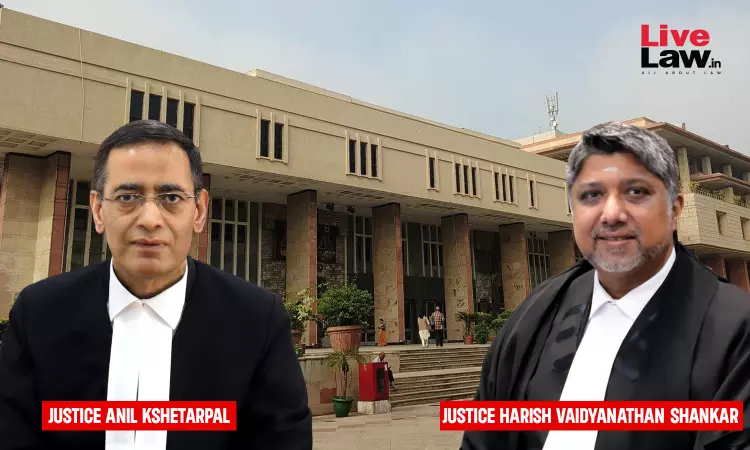- Home
- /
- High Courts
- /
- Delhi High Court
- /
- 'Disheartening' That Even Educated...
'Disheartening' That Even Educated Parents Embroiled In Marital Discord Are Tutoring Or Influencing Children: Delhi High Court
Nupur Thapliyal
17 Sept 2025 11:00 AM IST
The Delhi High Court has observed that it cannot countenance the practice of even educated parents, embroiled in marital discord, tutoring or influencing their minor children. A division bench comprising Justice Anil Kshetarpal and Justice Harish Vaidyanathan Shankar said that unfortunately, in cases where parents are embroiled in "marital discord", it is often seen that the "child becomes...
The Delhi High Court has observed that it cannot countenance the practice of even educated parents, embroiled in marital discord, tutoring or influencing their minor children.
A division bench comprising Justice Anil Kshetarpal and Justice Harish Vaidyanathan Shankar said that unfortunately, in cases where parents are embroiled in "marital discord", it is often seen that the "child becomes the subject of constant tutoring" and influence by either side.
The Court said that such a conduct, instead of serving the child's welfare, inflicts irreparable harm upon his or her personality, self-confidence, and emotional growth.
“It is indeed disheartening that even educated parents, who ought to be more conscious of their parental responsibilities, engage in such conduct to the detriment of their own children. The Court cannot countenance this practice and must impress upon the parties that it is their solemn duty to allow the child to grow in a free and nurturing atmosphere, unburdened by the acrimony between the parents,” it said.
The Bench was dealing with a mother's plea challenging an interlocutory order passed by the Family Court granting unsupervised visitation rights to father on the first and fourth Saturday of every month for three hours.
A Contempt Petition was also filed by the husband alleging that the wife had obstructed implementation of the interlocutory order by continuing to interfere during visitation hours, particularly by holding the minor child's hand during visitation at the mall.
The Counsellor in her report recorded that the child was “very much comfortable” in the presence of the father and continued to interact and play with him without hesitation.
It was, however, noted that the child displayed separation anxiety whenever the mother attempted to step outside the visitation room, insisting on her presence during the interaction.
The report of the Child Psychologist observed that the child, having grown up entirely in the company of the mother, initially exhibited discomfort with the father's presence but gradually showed improvement in follow-up sessions, becoming receptive to interaction and accepting gifts.
It was further noted that the child remained clingy towards the mother and that the mother also displayed a protective attitude, being reluctant to leave the child alone during sessions.
It was the mother's case that the minor child, being barely five years of age, continued to exhibit discomfort in her absence and that compelling unsupervised interaction with the father was contrary to the minor's welfare.
It was also submitted that the father had, in the past, displayed aggressive behaviour, and on one occasion even attempted to forcibly pull the child, thereby endangering his safety.
On the other hand, the father said that the reports of the Court Counsellor and the Child Psychologist demonstrated that the child had been gradually developing comfort with the father and that more frequent and independent interaction was in the child's best interest.
Disposing of the pleas, the Court said that while adjudicating disputes pertaining to custody or visitation, the paramount consideration before the Court is the welfare and best interest of the child, and not the competing rights of the parents.
“The law is well settled that a child of tender years requires the love, affection, and guidance of both parents, and the estrangement of the parents ought not to deprive the child of the emotional security and healthy environment that comes from an active relationship with both father and mother,” the Court said.
It noted that the minor child was in the exclusive care and custody of the mother and, as a natural corollary, had developed greater attachment and dependence upon her.
It said that no interference with the Impugned Order was called for, adding that any modification in the visitation arrangement, if warranted by subsequent events or the evolving needs of the child, can be appropriately considered by the Family Court.
Further, the Bench said that arrangement directed in the impugned order was in consonance with the welfare of the minor child and sought to progressively facilitate a healthy relationship with both parents.
Regarding the father's grievance regarding the alleged obstruction by the mother in the exercise of visitation rights, the Court said that the grievance was in the nature of an implementation issue, which fell within the domain of the Family Court.
“The parties are, therefore, relegated to their remedy before the Family Court for seeking any modification, clarification, or enforcement of the Impugned Order, as may be necessary in the facts and circumstances,” the Court said.
Title: X v. Y and other connected matter
Citation: 2025 LiveLaw (Del) 1130



